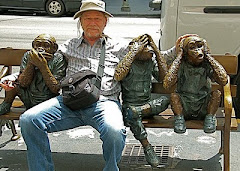 Our exquisite blue little planet: the only home we’ve got "NASA - The Blue Marble" by smiteme is licensed under CC BY-NC-ND 2.0 |
Observing the recent rise in conspiratorial beliefs and pseudoscience, a visitor from another planet might diagnosis much of the American public as delusional. So says Nicole Karlis in a recent edition of Salon Magazine.1 After all, a third of all Republicans think the COVOD-19 outbreak is a plot by a powerful elite. Sadly, eighteen percent of Democrats agree. On top of that, a majority of Republicans believe Trump won the last election, despite no evidence of fraud.
The only thing Americans can agree upon today is that we disagree.
Are many of us delusional? Karlis says, yes, a large swath of us are suffering from delusional behavior, a condition predicted long ago by Swiss psychiatrist Carl Jung. According to this renowned psychologist, individuals are easily attracted to 'unreal ideas,’ because we aren't as rational as we think we are.
To Jung, Americans were particularly prone to such society-breaking delusions because we are blind to our past; as a result, we don’t have the tools to make mature judgments about the present. To remedy this, we would have to overhaul our whole educational system.
Toward that end, the educator, Roosevelt Montas, promotes studying Great Books as necessary for everyone to get “a sense of how to decide what your life is for amid all the possible choices before you; understanding that the ethics of how civilizations and power operate is complex rather than reducible to facile binaries and snap judgments.”2
At one time, Montas was in charge of the Great Book core curriculum that I completed during my freshman year at Columbia, back in 1963. Looking back on it now, I see these seminars were a transformative learning experience: sitting around a table several times a week, debating the big questions of life in the company of some of the wisest authors of all time.
Karlis also highlighted another central theme of Jung's work: society can't thrive without a central guiding paradigm. Studying Great Books can also help here, shining a light on the dynamics of how civilizations change over time. One learns that Christianity provided a stable underpinning for the West for over a thousand years until the Renaissance emerged, putting reason over faith; then, in the late 19th Century, modernism arose, predicting that industrialism and technological advances would improve life for everyone.
Faith in technology was still ascendant when I was growing up, as I once wrote about in my blog: “During that time, science was next to godliness; we wholeheartedly supported its quest to unravel the mystery of life while making life a breeze for all of us. A senate committee in the 1960s projected that as a result of improved technology, the American workweek would be reduced to 14 hours by 2000. And scientists predicted we would soon have unlimited atomic power “too cheap to meter.”
Sadly, those rosy predictions ran aground on the shoals of capitalism. Instead, working folks are slaving away for many more hours to earn a smaller paycheck on a treadmill that moves faster each year; meanwhile, inequality between the haves and the have nots continues to rise, while the cost of everything has skyrocketed. In addition, rather than basking in paradise, we now face toxic pollution, pandemics, and the threat of climate change apocalypse.
The bloom is now off the rose, causing unrest and paranoia across the country. Rather than viewing science as our savior, it is now often seen as the enemy. The government, it is said, no longer works for the ordinary person. Too often, authorities are accused of “just making things up." Rational analysis, based on facts, is now often ridiculed as the highfalutin, mumble-jumble.
The center no longer holds.
Our common guiding myth has shattered, like what happened to Humpty Dumpty when he fell off the wall. Some associate this fragmentation with postmodernism, which, for some in academia, means downplaying the idea of universal Truth. Instead, they contend that our world is socially constructed, resulting in multiple truths depending on an individual's background and standing in society.
Jung is correct: finding a path back to reality is crucial to our survival. The question is, divided as we are, is there still a common theme that might unite us. To my way of thinking, a book published back in 1997 points the way: Resurgence of the Real by Charlene Spretnak.3 She calls it ecological postmodernism.
While she acknowledges that some aspects of reality are socially constructed, the essential parts that make us human are really real: the innate wisdom of our bodies, our sense of place, and Nature Herself. These truths, spelled with a capital 'T,' could be the basis of a new paradigm, replacing the groundlessness of today with "the groundedness of bodily, ecological, and cosmological processes."
I guess some would call this a new religion celebrating the Earth, but nothing about it is new: indigenous peoples around the world have been practicing it since the dawn of time.
xxx
1 ttps://www.salon.com/2021/12/14/is-america-experiencing-mass-psychosis/
3 The Resurgence of the Real: Body, Nature, and Place in the Hypermodern World by Charlene Spretnak




















